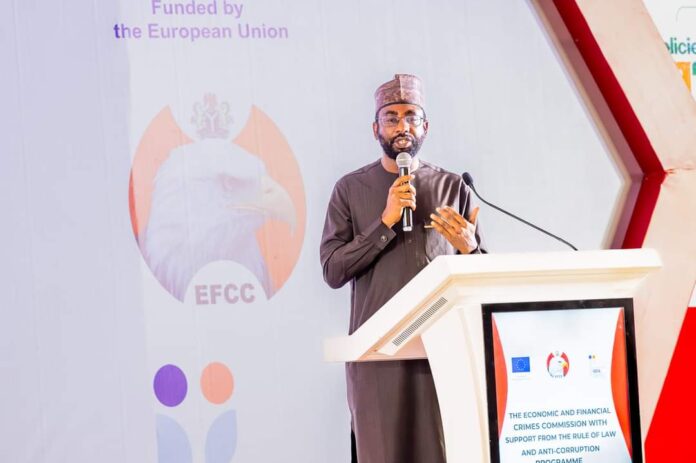NITDA Stakeholder Engagement: Collective Vision for Nigeria’s Digital Innovation
By Mubarak Umar
The National Information Technology Development Agency (NITDA), in partnership with Lagos Business School recently convened a Stakeholders’ Engagement Workshop, themed “Engaging Stakeholders for the Advancement of Nigeria’s Digital Economy with a Focus on NITDA’s Role as a Regulator and Enabler.”
The strategic workshop held in Lagos and Abuja aimed to foster deeper connections, understand sector-specific challenges, and create pathways for collaboration to drive Nigeria’s digital transformation. Through this workshop, NITDA reaffirmed its evolving role as both a regulator and enabler, dedicated to fostering a digital economy that aligns with the nation’s goals for innovation, economic diversification, and global competitiveness.
It is worthy to note that the engagement perfectly falls under the seventh pillar of NITDA’s Strategic Roadmap and Action Plan (SRAP 2.0) – Forge Strategic Partnerships and Collaboration, which the Agency views as instrumental in advancing Nigeria’s digital economy through leveraging the strengths and expertise of diverse stakeholders, tap into the resources of international organisations, multinational corporations, and research institutions.
The workshop attracted a diverse mix of public and private sector stakeholders, including industry leaders, consumer rights advocates, civil society representatives, academic professionals, and international organisations.
Each group offered unique insights into the challenges and expectations surrounding Nigeria’s technology ecosystem, bringing to light critical themes that inform both regulatory considerations and market needs.
Convening these voices under one roof, NITDA portrayed the importance of collective responsibility in shaping policies that can lead Nigeria toward a robust digital economy in line with President Bola Ahmed Tinubu administration’s priority areas of accelerating diversification through industrialization, digitization, creative arts, manufacturing and innovation, and reform the economy to deliver sustained inclusive growth.
The Agency understand that Nigeria faces both unprecedented opportunities and challenges, and the workshop’s primary objective was to align NITDA’s goals with the diverse needs of its stakeholders. As part of this goal, the workshop facilitated discussions on a broad range of themes, such as regulatory challenges, digital rights, data protection, research, and skills development, each of which is integral to a thriving digital environment.
Industry participants, representing private and public sectors, contributed perspectives on how regulatory measures could better support innovation and reduce barriers to business operations in Nigeria’s digital sector, and the Agency is aiming to refine its regulatory framework to not only foster growth but also ensure an equitable playing field for local and international players.
For civil society and consumer advocates, the focus was on data protection and digital rights, affirming the Agency’s role in safeguarding consumer interests and building public trust in Nigeria’s digital products and services.
In parallel, the academic sector and international organisations provided insights on capacity building, research needs, and the adoption of global best practices. Their input focused on the necessity of equipping Nigeria’s workforce with skills that meet international standards, a factor that has a significant bearing on Nigeria’s attractiveness as an investment destination and its ability to compete in a global digital marketplace.
Lagos Business School (LBS), renowned for its expertise in business and economic strategy, enriched the workshop by presenting an overview of current market trends and the economic outlook for Nigeria’s digital economy. Their analysis offered an understanding of the opportunities, challenges, and potential impact areas where NITDA’s regulatory focus could drive meaningful outcomes.
LBS’s insights allowed stakeholders to envision the future of Nigeria’s digital economy with a clear understanding of the current trends in emerging technologies, consumer behavior shifts, and the growing influence of digital services in Nigeria. The presentation set a foundation for discussions around strategic opportunities that align with NITDA’s goals for national digital transformation.
A key feature of the workshop was its structured breakout sessions, where stakeholder groups discussed unmet needs, potential regulatory improvements, and collaborative strategies. These discussions offered stakeholders the chance to present actionable feedback and strategic recommendations aimed at fostering innovation, transparency, and consumer confidence within Nigeria’s digital economy.
This inclusive dialogue enabled NITDA to gain firsthand information into the unique needs of each sector, empowering the agency to adapt its policies to better support both industry and societal priorities.
In his remarks, the Director-General of NITDA, Kashifu Inuwa reiterated the agency’s dedication to a stakeholder-centric approach to policy development, emphasising that Nigeria’s digital transformation depends on inclusive, transparent policymaking.
He thanked participants for their candid input and expressed confidence that the insights gathered would be instrumental in shaping policies that address real-world challenges while promoting economic growth, innovation, and public trust.
The Director-General further reassured participants of NITDA’s commitment to implementing improved communication channels to ensure ongoing dialogue with stakeholders, making the agency’s processes more transparent and responsive to evolving market needs. This commitment to open dialogue is intended to reinforce the agency’s accountability, helping to build a robust regulatory framework that supports Nigeria’s digital economy.
The NITDA Stakeholders’ Engagement Workshop represents a significant step towards building a robust and sustainable digital economy in Nigeria, fostering collaboration, addressing regulatory challenges, and promoting innovation.
Through this workshop, NITDA not only reinforced its role as a regulator but also emphasised its commitment to enabling growth, innovation, and sustainable partnerships.
















